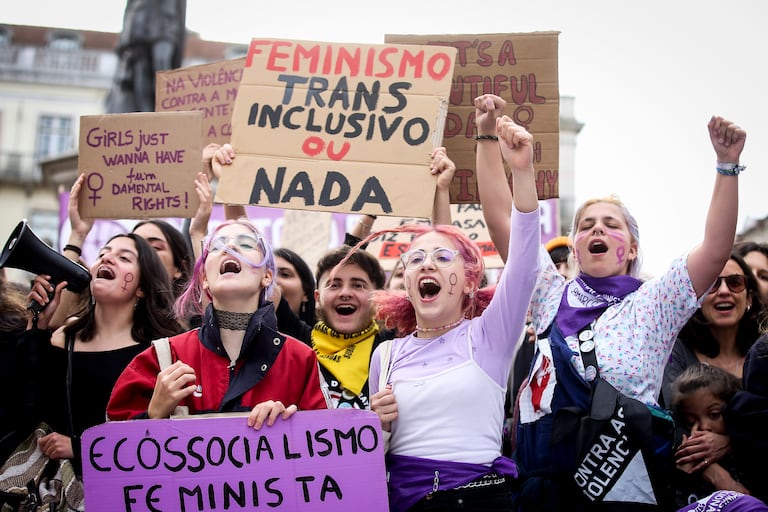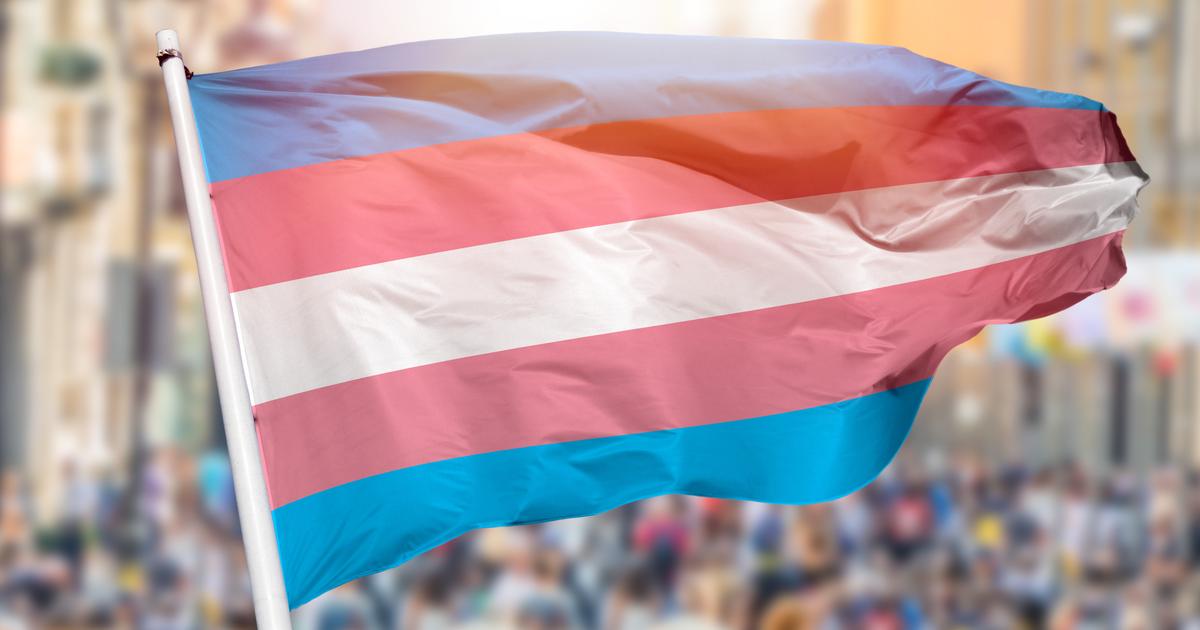Trans claim at the March 8 demonstration in Lisbon, Portugal, in 2020.NUNO FOX / EFE
Free self-determination of gender (being able to change the name and sex on the DNI without the need for medical reports or hormonal treatments) is already a reality in at least a dozen European countries.
The first was the Netherlands in 2013 and among the last, neighboring Portugal, which has been recognized since 2018. Spain has pending the approval of a law in 2021, although right now the negotiation is stalled between the Government partners.
However, Spain would not be the first to withdraw the medical requirements, but it does go further than most in an aspect that is included in the draft that is being debated: it allows free self-determination of gender from the age of 16 without the need for parental permission.
Eight European countries regulate it from the age of 18 (Portugal, Belgium, France, Ireland, Greece, Denmark, Luxembourg and Malta), and some of these provide it at 16 but with parental approval.
And only two, the Netherlands and Norway (which is not part of the EU), allow it from the age of 16 as contemplated in the proposal of the Ministry of Equality.
Ireland raised this in an amendment in 2017, which is still pending.
The comparative data comes from a report on the laws of different countries, prepared in 2019 by Ilga (the international association of lesbians, gays, bisexuals, trans and intersex), which you can consult at this link.
In the document, they reflect that Greece asks that minors be analyzed by an interdisciplinary committee with psychiatrists, endocrinologists, social workers and pediatricians, for example.
Meanwhile, Portugal or Ireland claim parental permission.
The 'trans law' from opposite angles
A comparative law study commissioned by Moncloa on 14 countries, the content of which was advanced this Monday by Cadena SER, analyzes those mentioned in Europe plus Argentina, Colombia, Ecuador and Chile in Latin America, where free gender self-determination is also contemplated based on 18 years.
The report concludes that all these countries include more severe requirements for self-determination than just "the express declaration of the person concerned", as provided for in the Spanish draft and as also requested by the PSOE when it wrote a proposal in 2017 that achieved the support of all political forces in 2019, when Vox was not yet in parliament.
The socialist part of the Executive does not look favorably on the draft of United We Can.
Until now he had alleged "legal insecurity" without clarifying in what terms.
The PSOE has started meetings in parallel with three organizations that worked on the draft with Equality (Felgtb, Fundación Triángulo and Chrysallis), in which representatives of the party, the parliamentary group and the socialist part of the Executive participate.
According to socialist sources, the commitment with the organizations is to have the project in process "in April or May" so that there is a proposal underway for Gay Pride Day at the end of June.
They will propose a formula "intermediate guarantor" between Danish law, which provides a six-month reflection period before formalizing the change, and that of Portugal, which provides that the second time you change your sex you go to court.
"We have no evidence that there has been any request in this regard in Portugal," Marta Ramos, director of Ilga in the neighboring country, explains by phone.
He assures that this clause was included "at the request of the political parties."
According to official data, since the Portuguese approved gender self-determination in 2018 without the need for a medical report or hormonal treatment, 568 people have requested a sex change in the civil registry.
Of these, 42 were minors.
Since 2020 it is a free procedure, before it cost 200 euros.
Ramos explains that, since the request is made, eight days elapse until the person receives the birth certificate with the new sex and the new name and can change their documents.
Belgium led the Constitutional Court to limit the second registered sex change
In 2017, a new law was approved in Belgium, similar to the one currently being debated in Spain.
Until then, irreversible sterilization, surgery and the judgment of a psychiatrist were required.
Now the principle of "self-determination" governs, so that everyone has the right to go to the registry and request a change according to the gender that they feel "intimately" in a simple procedure that requires simply to appear twice before the official, with a period reflection of three months in between.
The plaintiff is informed of the legal and administrative consequences of the act and the request is sent to the Public Prosecutor's Office, which could deny it in case it appreciates “public disorder”, although it is a mere procedure.
In 2018, the number of changes in the registry increased almost sevenfold (from 110 to 742).
Between 1993 and September 2019 (latest data from the Equality Institute), 2,193 sex changes were made in the registry, more than half from the 2017 law.
The new regulation was appealed in 2018 before the Constitutional Court by groups that considered that it had fallen short.
And its judges agreed and decided to annul two articles.
The first of them, the one that only allowed free change in the registry for the first time and forced to go through the courts for successive times.
It was a kind of anti-fraud measure that, however, the high court considered unconstitutional, since if these precautions were sufficient for the first act, they should also be for the following.
It also forced us to rethink an alternative for the registration of sex, considering that circumscribing it only to men and women is discriminatory for those who do not feel identified with either of these two categories: “There is no reasonable justification for people whose identity gender is non-binary, they are obliged to accept, in their birth certificates, a sex record based on a choice between a woman and a man that does not correspond to their intimately lived gender identity ”, alleged the Constitutional Court.
And it left it up to the legislature to find solutions.
The Secretary of State for Gender Equality, Equal Opportunities and Diversity is doing this right now.
The debate is expected to be complex on this second point because it clashes with part of the feminist movement.
One of the solutions that are valued would be to eliminate any reference to gender from the identity card and the registry.
"But I think this would be going too far," says Pieter Cannoot, a researcher on Constitutional Law and Human Rights at the University of Ghent, who is currently preparing one of the draft proposals for the Belgian government.
"The feminist movements would be upset, because they want to maintain some kind of reference to be able to provide data on discrimination and differences."
In his opinion, a compromise solution could be to eliminate the reference to gender in the identity card, but keep it in the civil registries.
According to Cannoot, the debate will not be hostile as in Spain, but "constructive", as happened when the law was passed in 2017. And he assures that since then there have been neither fraud nor major problems regarding that possible competitive advantage that some groups fear (for example, in sports) no signs that any biological reality has been denied or can make it disappear.
"It is quite rare that in Belgium there are groups that say the same thing," says Sarah Schlitz, Secretary of State for Gender Equality, Equal Opportunities and Diversity.
“In fact, we distinguish the biological sex (male / female / intersex) that we cannot change from the gender (female / masculine / non-binary / fluid gender) that we can change.
We do not deny the biological reality, we speak of gender identity ”.
And in any case, the discussion is not very heated.
"People who change gender in their commune are still very few, it is quite marginal, it does not represent a great change for the rest of society, it only gives the opportunity for anyone to define themselves as they want."
The French antecedent of the feminist struggle
In France, the debate on whether recognizing the registered sex of trans people endangers the rights of women, as part of Spanish feminism maintains, had its climax just a year ago, after the well-known feminist activist Marguerite Stern said in social networks that this question "wants to colonize the feminist debate."
This caused a division, not yet overcome, in the movement.
But this dispute has not had a political or legal impact, since the regulations that allowed progress - although still with many shortcomings, according to LGTB groups and even the French Ombudsman - the rights of trans people had by then already in force more than three years.
"In France, that battle was already lost, because the law already existed," says Stéphanie Nicot, spokesperson for the LGTB Federation.
As one of the promoters of the law in France says she does not understand the position of feminists who oppose a law in Spain.
"They are not even at the level of a Simone de Beauvoir who in the 1950s who said that you are not born a woman, you become one", ironizes this 68-year-old activist, retired teacher and writer.
The rules that allow the change of name and sex are established in the
21st century justice modernization law that came into force in November 2016. For the first time since 1992, in order to change the gender marker, the applicant was not required to undergo a sterilization process, a condemned issue by the European Court of Human Rights (ECHR).
It is only required that “any person of legal age (or emancipated minor) who demonstrates with a 'sufficient gathering of facts' that the mention relative to their sex in the civil status records does not correspond to the one that person already presents the one that is known ”.
As “facts” to be demonstrated, three cases are expressly cited: that the person requesting the change of marker “appears publicly as belonging to the claimed sex”, that “is known under the claimed sex in his or her family, friendly or professional environment” or that "You have obtained the change of name corresponding to the sex you claim."
Although the 2016 law was celebrated as a good step forward, numerous trans associations criticized the continuation of the “judicialization” of the procedures, that is, that in the end it was a court that decided.
An issue that has caused problems due to the “disparity of behavior on the ground, according to the ideologies in the areas,” says Nicot, to the point that the Ombudsman (the French Ombudsman) highlighted it in a report issued in 2020. Although the law establishes that the change of name or marker must be carried out “within 15 days after the date on which that decision has been judicially approved”, the Ombudsman regretted that “current legislation and its application modalities in some jurisdictions or mayors they are capable of provoking long processes of several years ”.
For this reason, it recommended "implementing procedures for changing names and mentioning sex in the marital status that are declaratory, accessible and quick."
Specifically, it proposes that the presentation "before civil status officials of a detailed sworn statement that characterizes a legitimate interest is sufficient."













/cloudfront-eu-central-1.images.arcpublishing.com/prisa/S7ERVSCT4FUVX6R7TUVBDNTH5Y.jpg)
